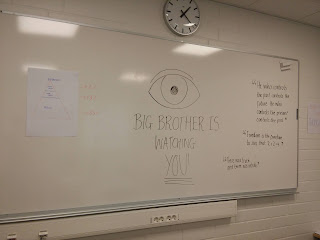Oceania is the fictional setting found in George Orwell's famous novel 1984. In case you've never read the book or watched the film, it's about a man called Winston who lives in a "Big Brother" society, where everyone's every move is watched and those who oppose the government are punished...or worse.
They were given a slightly baffling task to begin with. I told the class that we needed to practice our maths.
"What is one plus one?" I asked sweetly.
Some of the students caught onto my game immediately and answered, "Three."
"Wrong," I said. "It's actually four. What is two plus two?"
"Using whatever logic this is, it should be eight."
"Wrong!" The class frowned as I declared this. "It's five...obviously..."
There is a reason why I was being particularly bad at maths that day. In 1984, it is noted that "freedom is the freedom to say 2+2=4". So, I asked the class to write down lines of the incorrect sums - their freedom "lost" and a false belief complied with. In the meantime, I'd been quite sneaky and asked one of the students to take notes on the behaviour of the rest of the class while I left the room.
After a few minutes, I returned and revealed all. I guided the class through the world of 1984, introducing them to the idea of "newspeak", "thoughtcrimes", being under constant surveillance, and brainwashing. I also noted that in the book you never knew who might be observing you, in turn revealing the notes of their "spying" classmate.
The idea of surveillance, the invasion of privacy and possible loss of freedom were all topics at the heart of our lesson. We examined the extent to which "Big Brother" societies may exist. In doing so, we explored issues surrounding the National Security Agency (NSA) and Edward Snowden. This led us to the idea of valuing security over privacy and vice versa.
I challenged the class and asked them which they valued more: (personal) privacy or (personal) security? The answers were conflicting. We then decided to ask around Kalajoki to gather other views. Students surveyed Lukio and Merenojan as well as customers around Halpa-Halli and K-Market. Here were our results:
Overall, 39/54 of those surveyed favoured security while 15/54 favoured privacy. These results furthered our discussion. Some students were surprised (particularly by the younger generation's answers) while others were not. But why did any of this matter?
One student summarised, "You never know who might access data on you and what they might do with it."
Irrespective of where people stand on the matter, it is certainly something worth thinking about...







No comments:
Post a Comment